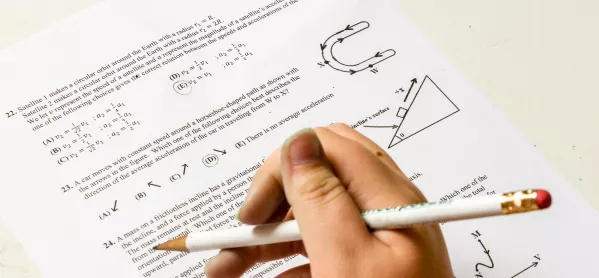- Home
- New qualifications are ‘open to gaming’
New qualifications are ‘open to gaming’

The quality-control system designed to ensure consistency in internal assessment for national qualifications is “predictable” and open to “gaming“, an academic has warned, after a Tes Scotland investigation into the process known as verification.
The University of Stirling’s Professor Mark Priestley - a curriculum studies expert who advises the Scottish government on education policy - made the comments after Tes Scotland found that the amount of verification being carried out by the Scottish Qualifications Authority (SQA) has plummeted since the new national qualifications started being introduced in 2013-14.
The number of samples of pupils’ graded work gathered by SQA from schools and colleges dropped by over 70 per cent between 2013-14 and 2016-17, from 4,561 to 1,291. Every year around half of the selections - a sample of work from a particular subject area, such as French - have been accepted by the SQA without recommendations.
Last year, 14 per cent were found to have “significant issues with the internal assessment approach and/or judgements”, which had to be resolved before the school or college could proceed with the qualification.
The SQA says verification was scaled back last year as one of a number of measures to tackle teacher workload. However, experts argue that verification levels have dropped because the SQA does not have the capacity to carry out the checks.
The SQA was tasked last year with removing unit assessments from National 5, Higher and Advanced Higher. At the time, SQA chief executive Janet Brown said the timeframe was “extremely, extremely aggressive”
One academic - the University of Edinburgh’s Professor Lindsay Paterson - even suggested verification had been scaled back because of “the potential embarrassment” of schools failing to hit the expected standard.
The Tes Scotland investigation comes at a time of concern about the credibility of the National 4 qualification, which is entirely internally assessed. The president of the Scottish Secondary Teachers’ Association (SSTA), Kevin Campbell, told Tes Scotland earlier this year that pressure on teachers to pass pupils was leading to “some pretty dodgy practices in schools”.
‘We need to take the pressure off’
Responding to the Tes Scotland investigation, SSTA general secretary Seamus Searson said that teachers were under pressure to make sure pupils passed N4. However, he argued more external verification was not the answer. “We need to take the pressure off. Heads need to trust teachers when they tell them the level pupils are at,” he said.
Professor Priestley said that the University of Stirling had carried out research for the SQA in 2010 which suggested teachers would game the system in “the current performative climate”, which sees them and their schools judged on exam results. The SQA had not published the research but “did know…that this could be a problem”, he said. As a result, he argued that “verification should be a random sampling across the range of assessed work and potentially across all centres”.
Professor Priestley added: “The scope and outlined methods of verification should be a concern. It seems rather predictable; and if it is known in advance what assessments are going to be verified, this will presumably allow gaming to go on where verification will not be occurring. If schools know what is assessed, they might behave strategically by focusing on boosting results selectively.”
The SQA said in response that as of last year unit verification had been restricted to schools and colleges new to delivering qualifications, or where problems had been identified in the past, which had resulted in “significantly reducing” the number of selections. It said random sampling had “continued to take place for remaining internally-assessed components” and it would return to random sampling this year for verification of units at all levels “with the exception of units at Higher and Advanced Higher”. The decision to reduce external verification last year was taken by the government’s Assessment and National Qualifications Group, chaired by the education secretary John Swinney, in a bid to reduce teacher workload, the SQA said.
A Scottish government spokeswoman said: “Changes to the external verification process were designed to balance both assessment-related workload, while also protecting the integrity and credibility of our national qualifications and the vital importance of maintaining confidence in their standards.”
This is an edited version of an article in the 8 December edition of Tes Scotland. Subscribers can read the full story here. To subscribe, click here. To download the digital edition, Android users can click here and iOS users can click here. Tes Scotland magazine is available at all good newsagents.
Want to keep up with the latest education news and opinion? Follow Tes on Twitter and Instagram, and like Tes on Facebook
Keep reading for just £1 per month
You've reached your limit of free articles this month. Subscribe for £1 per month for three months and get:
- Unlimited access to all Tes magazine content
- Exclusive subscriber-only stories
- Award-winning email newsletters



